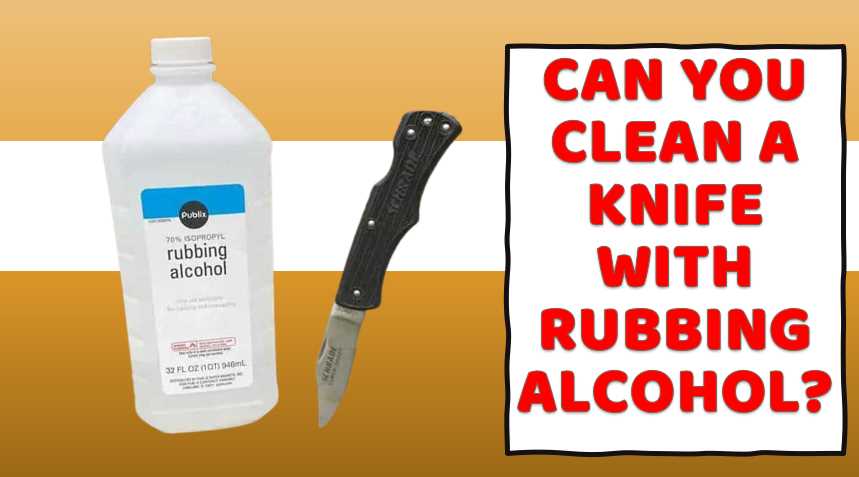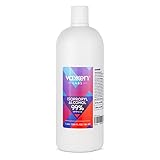Yes, you can clean a knife with rubbing alcohol. Rubbing alcohol is a versatile and effective cleaning agent that can be used for various purposes, including cleaning and disinfecting kitchen tools such as knives.
As a cook, I have used rubbing alcohol to clean my knives numerous times and found it a quick and easy method to keep them clean and sanitary. However, certain precautions need to be taken when using rubbing alcohol to clean knives, and it is important to understand the potential impact on knife performance. This article will explore rubbing alcohol as a knife cleaner, including its benefits, safety concerns, and tips for effective use.
What is Rubbing Alcohol?
Rubbing alcohol, or isopropyl alcohol, is a clear and colorless liquid with a strong odor. It is a solvent made by mixing water and either 70% or 90% isopropyl alcohol.
Different types of rubbing alcohol
There are two common types of rubbing alcohol available in the market- 70% and 90% isopropyl alcohol. While both types can be used to clean knives, 70% isopropyl alcohol is more commonly used in household cleaning due to its lower potency. Rubbing alcohol has many uses, including disinfecting surfaces, cleaning wounds, removing ink stains, and cleaning electronics.
Can rubbing alcohol disinfect a blade?
es, rubbing alcohol can disinfect a blade. Rubbing alcohol is a disinfectant that effectively kills many types of bacteria and viruses, including those that can cause foodborne illnesses. Rubbing alcohol can help sanitize and disinfect knives, making them safe for food preparation.
However, it’s important to note that rubbing alcohol is not a sterilizing agent and may not effectively kill all types of pathogens. It’s important to use rubbing alcohol in conjunction with other cleaning and sanitizing methods to ensure the safety of your knives and the food you prepare with them.
6 Benefits of Cleaning Knives with Rubbing Alcohol
- Disinfectant: Rubbing alcohol is a potent disinfectant that kills bacteria and viruses, making it a suitable cleaner for knives.
- Quick-drying: Rubbing alcohol evaporates quickly, reducing the time it takes to clean and dry a knife.
- Removes residue: Rubbing alcohol effectively removes grease, dirt, and other residues that may have accumulated on a knife.
- Safe on knives: Rubbing alcohol is safe for most types of knives, including stainless steel, carbon steel, and ceramic knives.
- Affordable: Rubbing alcohol is an affordable cleaning solution in most households and stores.
- Easy to use: Cleaning knives with rubbing alcohol is a simple process that requires minimal effort.
Safety concerns
While rubbing alcohol is safe for cleaning knives, it is essential to handle it with care. It is a flammable liquid and should be kept away from heat sources and flames. Additionally, it can cause skin irritation, so wearing gloves when using it is essential.
Potential impact on knife performance
Using rubbing alcohol to clean knives may have some impact on their performance. It is recommended to avoid using rubbing alcohol on wooden handles as it may dry them out and cause cracks. It is also essential to avoid soaking knives in rubbing alcohol as it may damage the blade’s protective coating.
My preferred method for cleaning knives is to use soap and water to remove any visible debris and then wipe the knife with a clean towel. I then used rubbing alcohol to disinfect the knife.
In my experience, cleaning knives with rubbing alcohol has been an effective and convenient method. There are two types of rubbing alcohol available in the market- isopropyl alcohol and ethyl alcohol. Isopropyl alcohol is also known as rubbing alcohol, while ethyl alcohol is commonly used for drinking. Rubbing alcohol is usually available from 60% to 99%.
Rubbing alcohol is disinfectant and antiseptic for cleaning wounds and cuts. It is also used in household cleaning products like glass cleaners, disinfectant sprays, and hand sanitizers. In the healthcare industry, rubbing alcohol is used to clean medical equipment and sanitize surfaces.
Advantages and disadvantages of using rubbing alcohol
The advantages of using rubbing alcohol to clean knives include its effectiveness in killing bacteria and removing food residue, quick drying time, and affordability. However, the disadvantages include potential safety concerns, the risk of damaging the knife’s handle or blade if not completely dried off, and the possibility of the alcohol affecting the knife’s performance over time.
7 Tips for Cleaning Knives with Rubbing Alcohol

Cleaning your knives with rubbing alcohol is a great way to keep them hygienic and well-maintained. However, using the right technique is important to avoid damaging the blade or handle. Here are 7 tips to keep in mind when cleaning knives with rubbing alcohol:
- Use 70% isopropyl alcohol: As mentioned earlier, 70% isopropyl alcohol is the best option for cleaning knives. Make sure to avoid using stronger concentrations, as they can damage the handle or blade.
- Apply the rubbing alcohol to a cloth or paper towel: Rather than pouring rubbing alcohol directly onto the knife, it’s better to apply it to a cloth or paper towel. This will help you control the alcohol you use and avoid over-saturating the knife.
- Wipe the blade down with the cloth: Start by wiping the blade down with a cloth or paper towel soaked in rubbing alcohol. Make sure to cover the entire blade, including the spine and tip.
- Clean the handle separately: If your knife handle is made of a material that can’t withstand rubbing alcohol, such as wood or bone, you should clean it separately with soap and water. Otherwise, you can use rubbing alcohol to clean the handle as well.
- Avoid soaking the knife in alcohol: Don’t leave the knife soaking in rubbing alcohol for an extended period. This can damage the handle and potentially affect the blade’s performance.
- Dry the knife thoroughly: After cleaning your knife with rubbing alcohol, dry it thoroughly with a clean cloth. This will help prevent any moisture from building up and potentially causing rust.
- Oil the blade: To further protect it, consider applying a small amount of oil after cleaning it with rubbing alcohol. This will help prevent rust and keep the blade lubricated.
Following these tips, you can safely and effectively clean your knives with rubbing alcohol, ensuring they stay sharp and hygienic.
Can you use rubbing alcohol to sharpen a dull knife blade?
No, rubbing alcohol cannot sharpen a dull knife blade. Rubbing alcohol is a disinfectant and cleaning agent, and it has no abrasive properties that can sharpen a blade. You can use a sharpening stone or honing steel to sharpen a dull knife.
Are there any alternatives to using rubbing alcohol to clean knives?
Yes, there are several alternatives to using rubbing alcohol to clean knives. Some popular options include:
- Warm soapy water: This is a simple and effective way to clean knives. Use mild dish soap and warm water to clean the blade, then dry it thoroughly with a towel.
- Vinegar: Vinegar is a natural cleaning agent used to clean and disinfect knives. Mix equal water and vinegar, then soak the blade in the solution for a few minutes before rinsing and drying.
- Baking soda: Baking soda can remove stains and odors from knives. Just mix baking soda and water to form a paste, then use a soft cloth toto scrub the blade gently.
- Lemon juice: Lemon juice can be used to clean and disinfect knives. Just cut a lemon in half and rub the blade with the cut side of the lemon, then rinse and dry.
- Commercial knife cleaners: Many commercial knife cleaners available on the market are specifically designed to clean and maintain knives.
How does using rubbing alcohol to clean knives compare to using vinegar or lemon juice?
Rubbing alcohol, vinegar, and lemon juice are all acidic substances that can be used to clean and disinfect knives. However, they have different properties and may be more effective for different purposes.
Rubbing alcohol is a powerful disinfectant that kills bacteria, viruses, and fungi. It is also a solvent, which can dissolve grease and other stubborn stains on knife blades. Vinegar is also a natural disinfectant, but it is milder than rubbing alcohol and is more effective at breaking down mineral deposits and another buildup on knife blades.
Lemon juice is a natural acid that can help to remove rust and stains from knife blades, but it is not as effective at killing bacteria as rubbing alcohol or vinegar.
Overall, using rubbing alcohol is a good option for disinfecting and cleaning knives that have come into contact with raw meat or other potentially harmful substances. However, vinegar or lemon juice may be more appropriate for removing mineral deposits or rust stains from knives.
It’s important to note that all these substances should be used cautiously and in moderation, as overuse can potentially damage the knife blade.
Can rubbing alcohol be used to remove adhesive residue from a knife blade?
Yes, rubbing alcohol can effectively remove adhesive residue from a knife blade. Dampen a cloth with rubbing alcohol and rub the affected area until the adhesive residue is removed.
However, it’s important to rinse the blade thoroughly with water and dry it completely afterward to prevent any leftover residue from affecting the knife’s performance.
Can rubbing alcohol be used to clean other kitchen tools, such as cutting boards and graters?
Yes, rubbing alcohol can clean kitchen tools like cutting boards, graters, and other utensils. It can effectively remove food residue and bacteria from surfaces.
However, it is essential to note that it may not be suitable for all materials, so it is important to check the manufacturer’s recommendations before rubbing alcohol on a surface or tool.
It is also important to rinse the surface or tool thoroughly with water after cleaning with rubbing alcohol to ensure that all residue is removed.
How does using rubbing alcohol compare to using soap and water to clean knives?
Rubbing alcohol to clean knives is a quick and effective method that does not require water or soap. However, soap and water are also effective for cleaning knives and other kitchen tools. While rubbing alcohol can effectively remove dirt, grime, and bacteria from a knife blade, soap and water can provide a more thorough cleaning by removing food particles and other debris.
Additionally, soap and water can be used to clean other kitchen tools, such as cutting boards and graters, which may be difficult to clean with rubbing alcohol alone. Ultimately, the choice between using rubbing alcohol and soap and water will depend on personal preference and the specific cleaning needs of the knives and kitchen tools in question.
Is it safe to use rubbing alcohol on expensive or collectible knives?
It is generally safe to use rubbing alcohol on most knife blades, including expensive or collectible ones. However, it is always recommended to refer to the manufacturer’s instructions or consult a professional before cleaning a valuable knife with any cleaning solution.
In addition, if the knife has any decorative elements or intricate designs, it is important to take extra care and avoid excessive rubbing or soaking to prevent damage.
Can you use rubbing alcohol to remove food odors from knives?
Yes, rubbing alcohol can be used to remove food odors from knives. When you use your knife to cut foods like onions, garlic, or fish, the odors can stick to the blade and linger even after you wash the knife with soap and water.
Rubbing alcohol effectively breaks down the oils and compounds responsible for the odors, making it a great solution for removing unwanted smells from your knife. Soak a clean cloth with rubbing alcohol and wipe down the blade to get into any nooks or crannies where food debris may have accumulated.
What precautions should you take when cleaning knives with rubbing alcohol?
When cleaning knives with rubbing alcohol, there are a few precautions you should take to ensure your safety and the longevity of your knives. Here are some tips to keep in mind:
- Wear gloves to protect your hands from the alcohol and any sharp edges of the knives.
- Work in a well-ventilated area to avoid inhaling the fumes.
- Keep rubbing alcohol away from heat sources, sparks, and open flames, as it is highly flammable.
- Use a clean cloth or paper towel to apply the rubbing alcohol, and avoid using abrasive materials that can scratch the surface of the knives.
- Rinse the knives thoroughly with water after cleaning to remove any residue.
- Dry the knives completely with a clean towel or air-dry them to prevent rust.
- Store the knives in a safe and dry place, preferably in a knife block or on a magnetic strip, away from other kitchen tools and utensils.
By following these precautions, you can safely and effectively clean your knives with rubbing alcohol.
Should you dilute rubbing alcohol before using it to clean knives?
It is not necessary to dilute rubbing alcohol before using it to clean knives. Rubbing alcohol is typically used in its full-strength form, as diluting it can reduce its effectiveness as a cleaner and disinfectant.
However, it is important to follow the instructions on the bottle and use it in a well-ventilated area. If you have concerns about using full-strength rubbing alcohol, you can use a lower-concentration solution such as 70% rubbing alcohol.
Is rubbing alcohol safe to use on all types of knife materials?
Rubbing alcohol is generally safe for most knife materials, such as stainless steel, carbon steel, and ceramic. However, it is important to read the manufacturer’s instructions and consult a professional knife expert if you need clarification on rubbing alcohol on your specific type of knife.
Some materials, such as brass and copper, may react negatively to rubbing alcohol and require a different cleaning method. Additionally, if your knife has any coatings or finishes, rubbing alcohol may strip or damage them, so it is important to use caution and test in a small area before using rubbing alcohol on the entire blade.
How often should you clean your knives with rubbing alcohol?
The frequency of cleaning knives with rubbing alcohol depends on the frequency of use and the type of food being cut. For example, if you use your knives daily to cut raw meat, it is recommended to clean them with rubbing alcohol after each use to prevent cross-contamination.
However, if you use your knives occasionally or for cutting vegetables and fruits, you may only need to clean them with rubbing alcohol once a week or less. Ultimately, it is best to err on caution and clean your knives with rubbing alcohol as often as possible to maintain their cleanliness and prevent the spread of harmful bacteria.
Final Words
Cleaning your knives with rubbing alcohol is a quick and effective way to keep them clean and hygienic. However, using the right technique and taking precautions is important to avoid damaging the knife or affecting its performance. Using 70% isopropyl alcohol, wiping the blade down with a cloth or paper towel, cleaning the handle separately if necessary, avoiding soaking the knife, drying it thoroughly, and oiling the blade, you can keep your knives in great shape for years to come. Remember always to prioritize safety and take care when handling sharp knives.

I may be a little “crazy” when it comes to cooking, but I enjoy every minute of it. Spending time in the kitchen itself, whether with my family or my friends, brings me both happiness and exhilaration. This blog was created to showcase my cooking/eating with family and friends. And also as an opportunity to discuss ideas on food and the culinary circle in general.





Pingback: Experience the Best Cut of Your Life with These 5 Bone Handle Steak Knives - Kitchen World
Pingback: Antler 6 Piece Handled Cheese Serving Set: A Must-Have for Cheese Lovers - Kitchen World